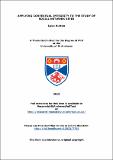Applying contextual integrity to the study of social network sites
Abstract
Social network sites (SNSs) have become very popular, with more than 1.39
billion people using Facebook alone. The ability to share large amounts of
personal information with these services, such as location traces, photos, and
messages, has raised a number of privacy concerns. The popularity of these
services has enabled new research directions, allowing researchers to collect
large amounts of data from SNSs to gain insight into how people share
information, and to identify and resolve issues with such services. There are
challenges to conducting such research responsibly, ensuring studies are
ethical and protect the privacy of participants, while ensuring research outputs
are sustainable and can be reproduced in the future.
These challenges motivate the application of a theoretical framework that can
be used to understand, identify, and mitigate the privacy impacts of emerging
SNSs, and the conduct of ethical SNS studies. In this thesis, we apply
Nissenbaum's model of contextual integrity to the study of SNSs. We develop an
architecture for conducting privacy-preserving and reproducible SNS studies
that upholds the contextual integrity of participants. We
apply the architecture to the study of informed consent to show that contextual
integrity can be leveraged to improve the acquisition of consent in such
studies. We then use contextual integrity to diagnose potential privacy
violations in an emerging form of SNS.
Type
Thesis, PhD Doctor of Philosophy
Collections
Items in the St Andrews Research Repository are protected by copyright, with all rights reserved, unless otherwise indicated.

